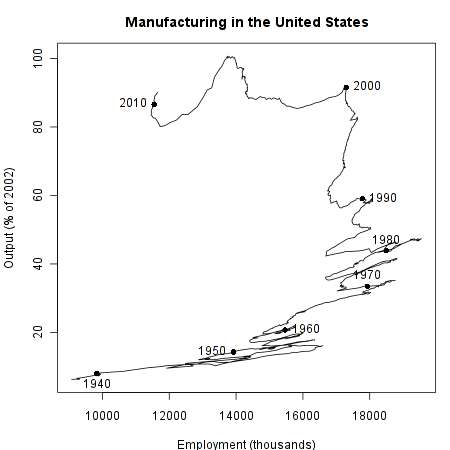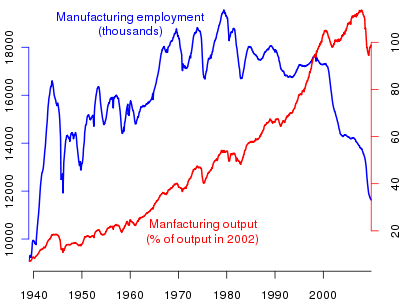In the process of trying to pull together some thoughts on intellectual property, zero marginal-cost goods, immaterial labor, and the incipient transition to a rentier form of capitalism, I've been working out a thought experiment: a possible future society I call *anti-Star Trek*. Consider this a stab at a [theory of posterity](http://www.peterfrase.com/2010/12/social-science-fiction/).
One of the intriguing things about the world of Star Trek, as Gene Roddenberry presented it in *The Next Generation* and subsequent series, is that it appears to be, in essence, a communist society. There is no money, everyone has access to whatever resources they need, and no-one is required to work. Liberated from the need to engage in wage labor for survival, people are free to get in spaceships and go flying around the galaxy for edification and adventure. Aliens who still believe in hoarding money and material acquisitions, like the Ferengi, are viewed as barbaric anachronisms.
The technical condition of possibility for this society is comprised of of two basic components. The first is the replicator, a technology that can [make instant copies of any object with no input of human labor](http://radar.oreilly.com/2010/12/diy-fabrication-hits-a-new-pri.html). The second is an apparently unlimited supply of free energy, due to anti-matter reactions or dilithium crystals or whatever. It is, in sum, a society that has overcome scarcity.
Anti-Star Trek takes these same technological premises: replicators, free energy, and a post-scarcity economy. But it casts them in a different set of social relations. Anti-Star Trek is an attempt to answer the following question:
* Given the material abundance made possible by the replicator, how would it be possible to maintain a system based on money, profit, and class power?
Economists [like to say](http://delong.typepad.com/sdj/2010/12/what-do-econ-1-students-need-to-remember-most-from-the-course.html) that capitalist market economies work optimally when they are used to allocate scarce goods. So how to maintain capitalism in a world where scarcity can be largely overcome? What follows is some steps toward an answer to this question.
Like industrial capitalism, the economy of anti-Star Trek rests on a specific state-enforced regime of property relations. However, the kind of property that is central to anti-Star Trek is not physical but *intellectual* property, as codified legally in the patent and copyright system. While contemporary defenders of intellectual property like to speak of it as though it is broadly analogous to other kinds of property, it is actually based on a quite different principle. As the (libertarian) economists Michele Boldrin and David K. Levine [point out](http://levine.sscnet.ucla.edu/general/intellectual/coffee.htm):
> Intellectual property law is not about your right to control your copy of your idea - this is a right that . . . does not need a great deal of protection. What intellectual property law is really about is about your right to control my copy of your idea. This is not a right ordinarily or automatically granted to the owners of other types of property. If I produce a cup of coffee, I have the right to choose whether or not to sell it to you or drink it myself. But my property right is not an automatic right both to sell you the cup of coffee and to tell you how to drink it.
This is the quality of intellectual property law that provides an economic foundation for anti-Star Trek: the ability to tell others how to use copies of an idea that you "own". In order to get access to a replicator, you have to buy one from a company that licenses you the right to use a replicator. (Someone can't give you a replicator or make one with their replicator, because that would violate their license). What's more, every time you make something with the replicator, you also need to pay a licensing fee to whoever owns the rights to that particular thing. So if the Captain Jean-Luc Picard of anti-Star Trek wanted ["tea, Earl Grey, hot"](http://www.youtube.com/watch?v=R2IJdfxWtPM), he would have to pay the company that has copyrighted the replicator pattern for hot Earl Grey tea. (Presumably some other company owns the rights to cold tea.)
This solves the problem of how to maintain for-profit capitalist enterprise, at least on the surface. Anyone who tries to supply their needs from their replicator without paying the copyright cartels would become an outlaw, like today's online file-sharers. But if everyone is constantly being forced to pay out money in licensing fees, then they need some way of *earning* money, and this brings up a new problem. With replicators around, there's no need for human labor in any kind of physical production. So what kind of jobs would exist in this economy? Here are a few possibilities.
1. *The creative class*. There will be a need for people to come up with new things to replicate, or new variations on old things, which can then be copyrighted and used as the basis for future licensing revenue. But this is never going to be a very large source of jobs, because the labor required to create a pattern that can be infinitely replicated is orders of magnitude less than the labor required in a physical production process in which the same object is made over and over again. What's more, we can see in today's world that lots of people [will create and innovate on their own](http://cyber.law.harvard.edu/wealth_of_networks/Main_Page), without being paid for it. The capitalists of anti-Star Trek would probably find it more economical to simply pick through the ranks of unpaid creators, find new ideas that seem promising, and then buy out the creators and turn the idea into the firm's intellectual property.
2. *Lawyers*. In a world where the economy is based on intellectual property, companies will constantly be [suing each other](http://yro.slashdot.org/story/10/12/10/154202/Worlds-Largest-Patent-Troll-Fires-First-Salvo) for alleged infringements of each others' copyrights and patents. This will provide employment for some significant fraction of the population, but again it's hard to see this being enough to sustain an entire economy. Particularly because of a theme that will arise again in the next couple of points: just about anything can, in principle, be automated. It's easy to imagine big intellectual property firms coming up with procedures for mass-filing lawsuits that rely on fewer and fewer human lawyers. On the other hand, perhaps an equilibrium will arise where every individual needs to keep a lawyer on retainer, because they can't afford the cost of auto-lawyer software but they must still fight off lawsuits from firms attempting to [win big damages for alleged infringment](http://news.cnet.com/8301-1023_3-20021735-93.html).
3. *Marketers*. As time goes on, the list of possible things you can replicate will only continue to grow, but people's money to buy licenses--and their time to enjoy the things they replicate--will not grow fast enough to keep up. The biggest threat to any given company's profits will not be the cost of labor or raw materials--since they don't need much or any of those--but rather the prospect that the licenses they own will lose out in popularity to those of competitors. So there will be an unending and cut-throat competition to market one company's intellectual properties as superior to the competition's: Coke over Pepsi, Ford over Toyota, and so on. This should keep a small army employed in advertizing and marketing. But once again, beware the spectre of automation: advances in data mining, machine learning and artificial intelligence may lessen the amount of human labor required even in these fields.
4. *Guard labor*. The term "Guard Labor" is [used by the economists Bowles and Jayadev](http://ideas.repec.org/p/ums/papers/2004-15.html) to refer to:
> The efforts of the monitors, guards, and military personnel . . . directed not toward production, but toward the enforcement of claims arising from exchanges and the pursuit or prevention of unilateral transfers of property ownership.
In other words, guard labor is the labor required in any society with great inequalities of wealth and power, in order to keep the poor and powerless from taking a share back from the rich and powerful. Since the whole point of *anti-Star Trek* is to maintain such inequalities even when they appear economically superfluous, there will obviously still be a great need for guard labor. And the additional burden of enforcing intellectual property restrictions will increase demand for such labor, since it requires careful monitoring of what was once considered private behavior. Once again, however, automation looms: robot police, anyone?
These, it seems to me, would be the main source of employment in the world of anti-Star Trek. It seems implausible, however, that this would be sufficient--the society would probably be subject to a persistent trend toward under-employment. This is particularly true given that all the sectors except (arguably) the first would be subject to pressures toward labor-saving technological innovation. What's more, there is also another way for private companies to avoid employing workers for some of these tasks: turn them into activities that people will find pleasurable, and will thus do for free on their own time. Firms like Google are already experimenting with such strategies. The computer scientist Luis von Ahn has specialized in developing ["games with a purpose"](www.cs.cmu.edu/~biglou/ieee-gwap.pdf): applications that present themselves to end users as enjoyable diversions, but which also perform a useful computational task. One of von Ahn's games asked users to identify objects in photos, and the data was then fed back into a database that was used for searching images. It doesn't take much imagination to see how this line of research could lead toward the world of Orson Scott Card's novel [*Ender's Game*](http://en.wikipedia.org/wiki/Ender's_Game), in which children remotely fight an interstellar war through what they think are video games.
Thus it seems that the main problem confronting the society of anti-Star Trek is the problem of effective demand: that is, how to ensure that people are able to earn enough money to be able to pay the licensing fees on which private profit depends. Of course, this isn't so different from the problem that confronted industrial capitalism, but it becomes more severe as human labor is increasingly squeezed out of the system, and human beings become superfluous as elements of *production*, even as they remain necessary as *consumers*.
Ultimately, even capitalist self-interest will require some redistribution of wealth downward in order to support demand. Society reaches a state in which, as the late André Gorz [put it](http://books.google.com/books?id=xRQOcJWXRwEC&pg=PA90&lpg=PA90&dq=gorz+%22means+of+payment%22&source=bl&ots=RjZtvZ7QxG&sig=eWqhIlEDIfuXfcIaAFkh5EHtiAw&hl=en&ei=fJYHTeHIOIK88gb_3v2hBw&sa=X&oi=book_result&ct=result&resnum=1&ved=0CBMQ6AEwAA#v=onepage&q&f=false), "the distribution of means of payment must correspond to the volume of wealth socially produced and not to the volume of work performed". This is particularly true--indeed, it is *necessarily* true--of a world based on intellectual property *rents* rather than on value based on labor-time.
But here the class of rentier-capitalists will confront a collective action problem. In principle, it would be possible to sustain the system by taxing the profits of profitable firms and redistributing the money back to consumers--possibly as [a no-strings attached guaranteed income](http://www.aei.org/book/846), and possibly in return for performing some kind of [meaningless](http://www.bbc.co.uk/news/uk-politics-11728546) [make-work](http://movieclips.com/4aBM-office-space-movie-did-you-get-the-memo/). But even if redistribution is desirable from the standpoint of the class as a whole, any individual company or rich person will be tempted to free-ride on the payments of others, and will therefore resist efforts to impose a redistributive tax. Of course, the government could also simply print money to give to the working class, but the resulting inflation would just be an indirect form of redistribution and would also be resisted. Finally, there is the option of funding consumption through consumer indebtedness--but this merely delays the demand crisis rather than resolving it, as residents of the present know all too well.
This all sets the stage for ongoing stagnation and crisis in the world of anti-Star Trek. And then, of course, there are the masses. Would the power of ideology be strong enough to induce people to accept the state of affairs I've described? Or would people start to ask why the wealth of knowledge and culture was being enclosed within restrictive laws, when "another world is possible" beyond the regime of artificial scarcity?



